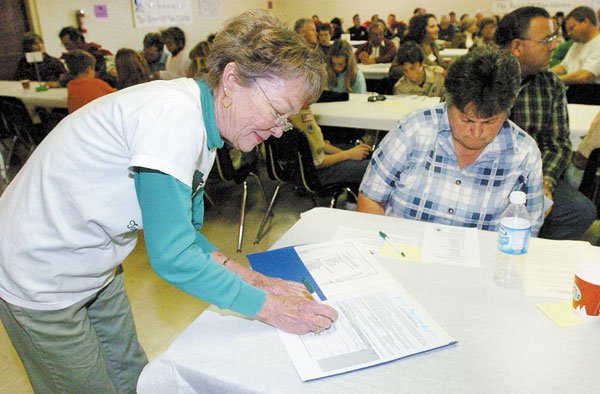Can a wealthy individual anonymously bankroll a community’s
incorporation attempt?
San Martin – Can a wealthy individual anonymously bankroll a community’s incorporation attempt?
The answer is yes – until the initiative hits the ballot, of course.
But in the case of San Martin’s effort to form a local government – a process that includes nearly $200,000 in application fees – there will be no traceable record of where the money comes from before the issue goes to voters.
“We don’t look specifically at how the (incorporation) proponents gather their money” to pay for processing fees, said Kathy Kretchmer, legal counsel for the Santa Clara County Local Agency Formation Commission. “There is no public record in that regard … other than the money is paid by the proponents.”
After San Martin’s incorporation bid qualifies as a ballot measure, the Political Reform Act would require the disclosure of all contributions and expenditures of $1,000 or more in support or opposition of the filing.
But up to that point, contributions are not legally required to be disclosed, said Roman Porter, a spokesman for the California Fair Political Practices Commission.
“I know this has been a controversy in other places,” said Peter Detwiler, staff consultant for the California Senate Local Government Committee. “It was a significant controversy a few years ago when the San Fernando Valley wanted to break away from Los Angeles and form its own city. There was a fair amount of controversy both financially and politically, and one of the questions was, ‘Who is bankrolling this secession movement?’ ”
The controversy and others like it led to Assembly Bill 745, which passed 74 to 0 on May 7. The bill, sponsored by Assemblyman Jim Silva, R-Orange County, a former Orange County supervisor and LAFCO commissioner, would require citizens to disclose contributions and expenditures related to LAFCO petition drives.
But the bill, currently under review in the California State Senate’s Local Government Committee, would not require disclosure of application-processing fees. Since San Martin cityhood proponents completed their incorporation petition in February, any new law would not apply to it.
Supervisor Don Gage doesn’t see a controversy in San Martin’s future.
“You still have to go before the voters” before it can become a city, Gage said.
In California, the incorporation process – and who pays the bills for it – varies from county to county. In Santa Clara County the San Martin Neighborhood Alliance, the nonprofit group that filed the cityhood application in March, will be required to pay for just about everything involved with the process. That includes hiring consultants, paying for a financial feasibility study, reimbursing LAFCO for staff time, paying for legal fees and possibly an environmental report.
After the many financial and legal requirements are met, public hearings will be held next summer before LAFCO allows the Santa Clara Board of Supervisors to qualify the issue for the November 2008 San Martin ballot.
“Each LAFCO in each county develops its own fee policy,” said Peter Brundage, director of the Sacramento County LAFCO, noting proponents of a new incorporation bid in his county are receiving up to $100,000 in assistance from tax payers to cover fees.
Even so, he said, the question of transparent fund-raising has “come up” because proponents still need to contribute about $100,000 in the process.
Sylvia Hamilton, president of the San Martin Neighborhood Alliance, said she is willing to be as open as possible in disclosing how the group raises its money – unless someone specifically asks to be anonymous.
“We don’t have a problem at all divulging those types of things,” Hamilton said. “But we’re still in the process of checking to see what the requirements are for folks who would prefer to be anonymous.”
While the alliance raised more than $5,000 at a spaghetti social recently and hopes to raise $25,000 at its annual car show in August, members of the group know it will take more than bake sales and special events to pay LAFCO’s fees.
“What’s our back-up plan?” asked Stu Carson, an alliance member. “We’ll probably look to wealthy members of the community.”
Alliance members also say they may turn to lending institutions, private businesses and the county for loan opportunities.
The alliance has raised nearly $20,000 this year. It owes LAFCO a payment of about $25,000 in early June. In August, the cityhood group will need to pay LAFCO an additional $30,000.
California LAFCO Director Bill Chiat, who works out of Sacramento, said he is not aware of financial transparency being a big statewide issue.
“I haven’t heard it,” Chiat said. “But it’s hard to identify statewide LAFCO issues. Each county is different … a lot depends on the community and the individual organizers who are working on the projects.”














